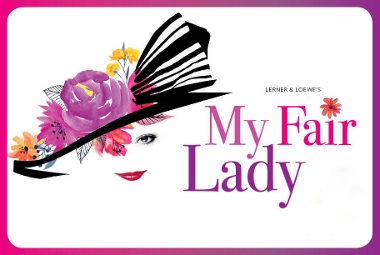
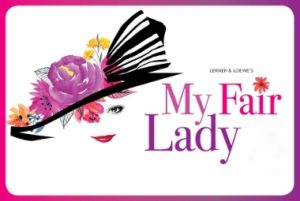 [rating=4] The past year in Chicago has been unusually heavy with productions of George Bernard Shaw’s Pygmalion and its musical adaptation by Alan Lerner and Frederick Loewe, My Fair Lady. But there’s no denying that the production at the Lyric Opera of Chicago, having the capacity to be seen by the most people and the largest and pre-eminent group of musicians, is the high point of the story’s iterations. This is year 5 of the Lyric’s summer Broadway programming, and if the energy of the crowd on opening night is any indication, these events are enormously popular with the public. Certainly, there could hardly be a better opportunity to hear Loewe’s music, and the original director of this new-to-Chicago-production, Robert Carson (who also directed the Lyric’s last show, Eugene Onegin), maximizes the humor in the piece. And if one gets the distinct feeling that he vastly prefers Pygmalion to what Lerner and Loewe did to Shaw’s script, and especially its ending, that just makes the production more interesting.
[rating=4] The past year in Chicago has been unusually heavy with productions of George Bernard Shaw’s Pygmalion and its musical adaptation by Alan Lerner and Frederick Loewe, My Fair Lady. But there’s no denying that the production at the Lyric Opera of Chicago, having the capacity to be seen by the most people and the largest and pre-eminent group of musicians, is the high point of the story’s iterations. This is year 5 of the Lyric’s summer Broadway programming, and if the energy of the crowd on opening night is any indication, these events are enormously popular with the public. Certainly, there could hardly be a better opportunity to hear Loewe’s music, and the original director of this new-to-Chicago-production, Robert Carson (who also directed the Lyric’s last show, Eugene Onegin), maximizes the humor in the piece. And if one gets the distinct feeling that he vastly prefers Pygmalion to what Lerner and Loewe did to Shaw’s script, and especially its ending, that just makes the production more interesting.
One day in early twentieth-century London (Carson claims to have moved the story up to the 1930s for the sake of better costumes, designed by Anthony Powell, but Pygmalion was originally set in 1913), Eliza Doolittle (Lisa O’Hare), a cockney girl, is selling flowers when she notices a man recording her speech. She is horrified and suspicious until he, Henry Higgins (Richard E. Grant), reveals that he is a linguist and is cataloging English dialects. Then he insults her, claiming that she has lowered the English tongue and that vulgarity and ignorance have created a divided nation. However, he does give her a large sum of money, which she uses to buy elocution lessons from him. Higgins bets a friend that he can teach Eliza such comportment that she would be mistaken for a lady of high class, proving his point that the lower orders can and should shape up. What happens to her afterward, he doesn’t care about.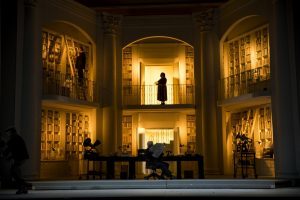
As played by Richard Grant, Higgins is such an extreme narcissist and possible sociopath he is often quite amusing. His singing is serviceable, but the real pleasure in songs like “Why Can’t the English?” and “A Hymn to Him” is watching him obliviously make an ass of himself. (In fairness, Shaw meant for Higgins to be living before the popularity of radio reduced the amount of variation between dialects, so when Higgins complains about people from the same country not being able to understand each other, he had a good point, although his belief that everybody ought to talk just like him was typical imperialist hubris.) Of course, his treatment of Eliza wouldn’t be nearly as amusing if she didn’t quickly toughen up and have the condescendingly genial Colonel Pickering (Nicholas Le Prevost), staid Mrs. Pierce (Cindy Gold), and wise Mrs. Higgins (Helen Carey) as allies. Lisa O’Hare is a delight every moment she’s onstage, possessing a perfect sense of comedy as well as dignity. Her Eliza is a fully realized character, and her classical soprano warble makes the songs “Wouldn’t It be Lovely?” and “I Could Have Danced All Night” as beautiful as anything on the Lyric’s stage.
Conductor David Chase captures the rich joy of Loewe’s music beginning with the opening overture and continues it all through the show’s three hours. Onstage, he is assisted by Bryce Pinkham in the tenor role of Freddie Eynsford-Hill, a 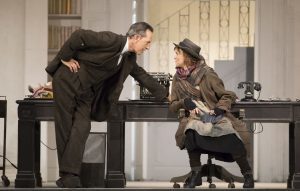 character who matches Eliza in appeal if not in steel (as per Shaw’s intentions). Donald Maxwell also does an amusing turn as Alfred Doolittle, Eliza’s smooth-talking father who offers self-serving philosophical justifications for his amorality and dominates the second act with the crowd scene “Get Me to the Church on Time.” This is also the portion of the show which makes the heaviest use of the cast’s many dancers.
character who matches Eliza in appeal if not in steel (as per Shaw’s intentions). Donald Maxwell also does an amusing turn as Alfred Doolittle, Eliza’s smooth-talking father who offers self-serving philosophical justifications for his amorality and dominates the second act with the crowd scene “Get Me to the Church on Time.” This is also the portion of the show which makes the heaviest use of the cast’s many dancers.
But as enjoyable as this My Fair Lady is, it’s not just a standard telling of the story with the Lyric’s assets. Carson wished to honor Shaw’s intention that there be only a trace of occasional affection between Higgins and Eliza. Grant’s performance in no way telegraphs “I’m just kidding” while he verbally abuses Eliza, and her denunciation of him is without regret. A romance between the Duke brothers and Eddie Murphy’s character in Trading Places seems as likely as between these two. Some fans of the show will miss that. But I vastly prefer it this way, and Lerner’s script draws so heavily from Pygmalion, that taking it to its natural conclusion makes much more sense.
My Fair Lady will continue at the Civic Opera House at 20 N Wacker Drive, Chicago, thru May 21, with performances as follows:
May 5: 7:00 pm
May 6: 1:30 pm & 7:00 pm
May 7: 1:30 pm
May 9: 1:30 pm
May 10: 1:30 pm
May 11: 1:30 pm & 7:00 pm
May 12: 8:00 pm
May 14: 1:30 pm
May 16: 7:00 pm
May 17: 1:30 pm & 7:00 pm
May 18: 7:00 pm
May 19: 7:00 pm
May 20: 1:30 pm & 7:00 pm
Tickets are $22-199 and may be purchased at LyricoOperal.org or by calling 312-827-5600.
Lyric Opera patrons get discounts at Poetry Garage, 201 W Madison St.
To see what others are saying, go to TheatreinChicago.com, go to Review Round-Up, and click “My Fair Lady.”

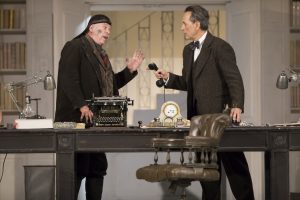
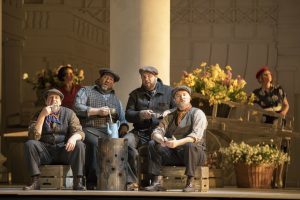
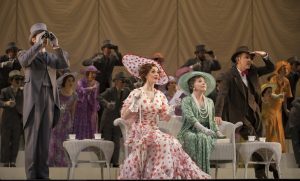





More Stories
“The Firebugs” reviewed by Julia W. Rath
“The Book of Grace” Al Bresloff with another from Paul LIsnek
“The Last Five Years” MILWAUKEE